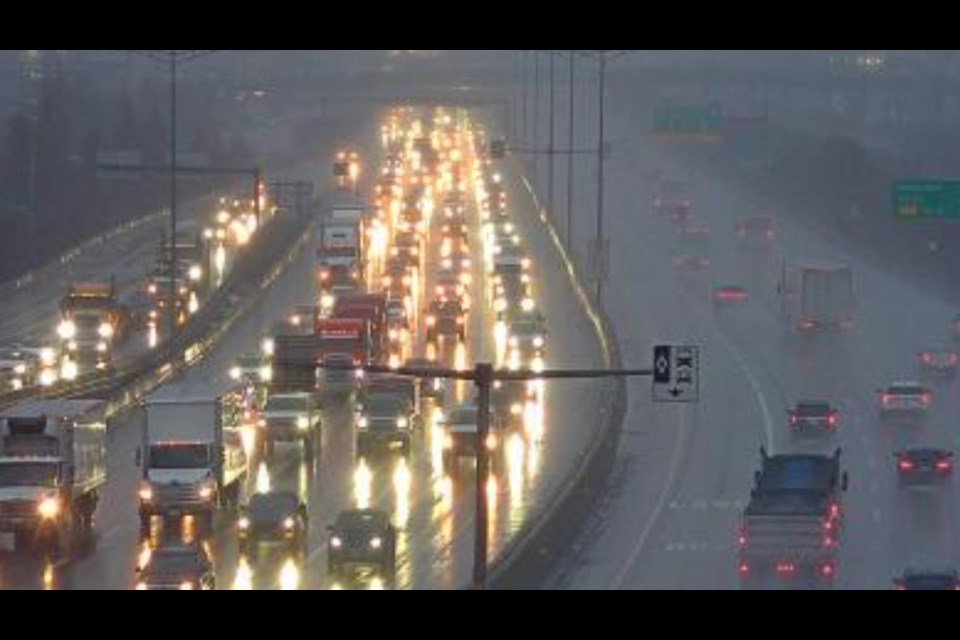A 48-hour transit strike has entered its second day in Metro Vancouver and congestion on B.C. highways is creating more chaos for commuters.
Bus supervisors walked off the job on Monday at 3 a.m. after the union (CUPE Local 4500) and Coast Mountain Bus Company (CMBC) couldn’t reach a deal. The union has been without a contract since 2022.
All buses and SeaBus operations are suspended across Metro Vancouver. West Vancouver Transit’s Blue Bus routes, which are staffed by members of a separate union, remain in operation, providing some mobility on the North Shore. There are also community shuttles running in Langley and on Bowen Island.
Service is expected to resume at 3 a.m. on Wednesday.
Just after 7 a.m. on Monday, staff at DriveBC posted that there is lots of vehicle congestion on B.C.'s highways.
"Heavy congestion observed this morning for commuters heading westbound on major routes due to vehicle incidents," says a spokesperson.
Highway 1, Highway 7 and Highway 7B all faced a slow down.
"Remember to check your route to give yourself extra time today,” says DriveBC.
More than 180 transit supervisors in the Lower Mainland are represented by CUPE Local 4500.
CUPE 4500 members will have picket lines up at CMBC Transit Centres in Vancouver, Surrey, Richmond, Burnaby, Port Coquitlam, and the Seabus North Vancouver Terminal.
In Port Coquitlam, a vehicle incident in the westbound lanes on Highway 7B created congestion at 6:50 a.m. Meanwhile, a crash on the Port Mann Bridge at 6 a.m. resulted in major delays. As of 9:40 a.m., Highway 7 is closed in both directions after a broken down tractor trailer. DriveBC is also reporting a vehicle fire has closed a section of Highway 91.
Should transit be an essential service in B.C.?
Andy Yan, director of the City Program at Simon Fraser University, believes the transit strike shows the resiliency gaps in Metro Vancouver’s system.
“I think that this really highlights the need to have ongoing support, not only from the fare box but from the provincial and federal levels of government,” says Yan.
He wasn't surprised to learn of the congestion as people turned to alternate transportation modes during the strike.
"I think if anything, it shows you the benefits of transit and that without the kind of transit system that we have, and with buses connecting up to trains, connecting to SeaBus, that it really shows to you actually how important transit is to the region now,” says Yan.
Based on his research, in 2001, only 11 per cent of the workforce used transit to get to work. By 2021, it was 15 per cent.
“Compared to other metropolitan areas around North America, this is actually very positive,” he says.
When asked about making transit an essential service, Yan says labour rights are important and suggests different levels of service that cannot be impacted. Currently, HandyDART buses are operational and not impacted by the transit strike.
"I think that as we build our communities and our cities around transit, I think that might actually be a very valid kind of debate,” says Yan.
He notes different levels of service could work, where some are deemed essential and others are not, so if a strike happens not all systems are cancelled.
Many of Yan’s students are unable to get to classes at SFU.
He tells Glacier Media he's watching closely to see what happens next.
“At what point does an inconvenience become an obstacle?” he questions.
Students, elderly people, medical workers and people who do not have a vehicle or a licence are being heavily impacted by the shutdown, as are those working in the food and accommodation industry (30 per cent use transit, according to Yan's research) and people working in the medical service (15 per cent).
“When it comes to income, you are talking about 20 per cent: one in five people. Workers earning less than $50,000 a year use transit to get to work,” says Yan.
What is the Metro Vancouver bus strike about?
According to the CMBC, supervisors have been offered a 13.5 per cent increase over three years, starting from Jan. 1, 2023, when the old three-year contract expired.
That brings a transit supervisor’s salary to $104,886, from $92,415.
The company says the union’s offer is a 25 per cent increase, to a salary of $115,477.
CUPE 4500 spokesperson Liam O’Neill said members deserve a fair deal.
“With the help of our mediator, CUPE 4500 put in an honest effort to find some common ground with Coast Mountain. But we are still not near where we need to be in addressing our key issues,” O'Neill said in a statement Monday morning.
“For a fair settlement, CUPE 4500 members need wage discrepancies closed between them and other TransLink supervisors, and we need to tackle critical workload issues.”
CMBC president and general manager Michael McDaniel said the union again refused the improved offer.
"Over the weekend, Coast Mountain Bus Company joined a mediator in an effort to reach an agreement with CUPE Local 4500. CMBC offered increased overtime pay, improved benefits, and committed to hiring more supervisors,” he said via a statement Monday morning.
What happens next?
TransLink CEO Kevin Quinn pleaded with the two groups to get a deal done.
"I urged the parties to return to the bargaining table and to resolve the dispute because this strike has too much impact on our customers who count on us."
Hundreds of thousands of people rely on the buses, noted Quinn.
“This is disappointing and frustrating,” he said. “This is unfair to our customers. The people of this region do not deserve to be caught in the middle of this dispute.”
O’Neill hinted supervisors would return to work on Wednesday but if a deal is not reached they will do an "escalation."
If you are a commuter and want to share your experience, please reach out to [email protected].



